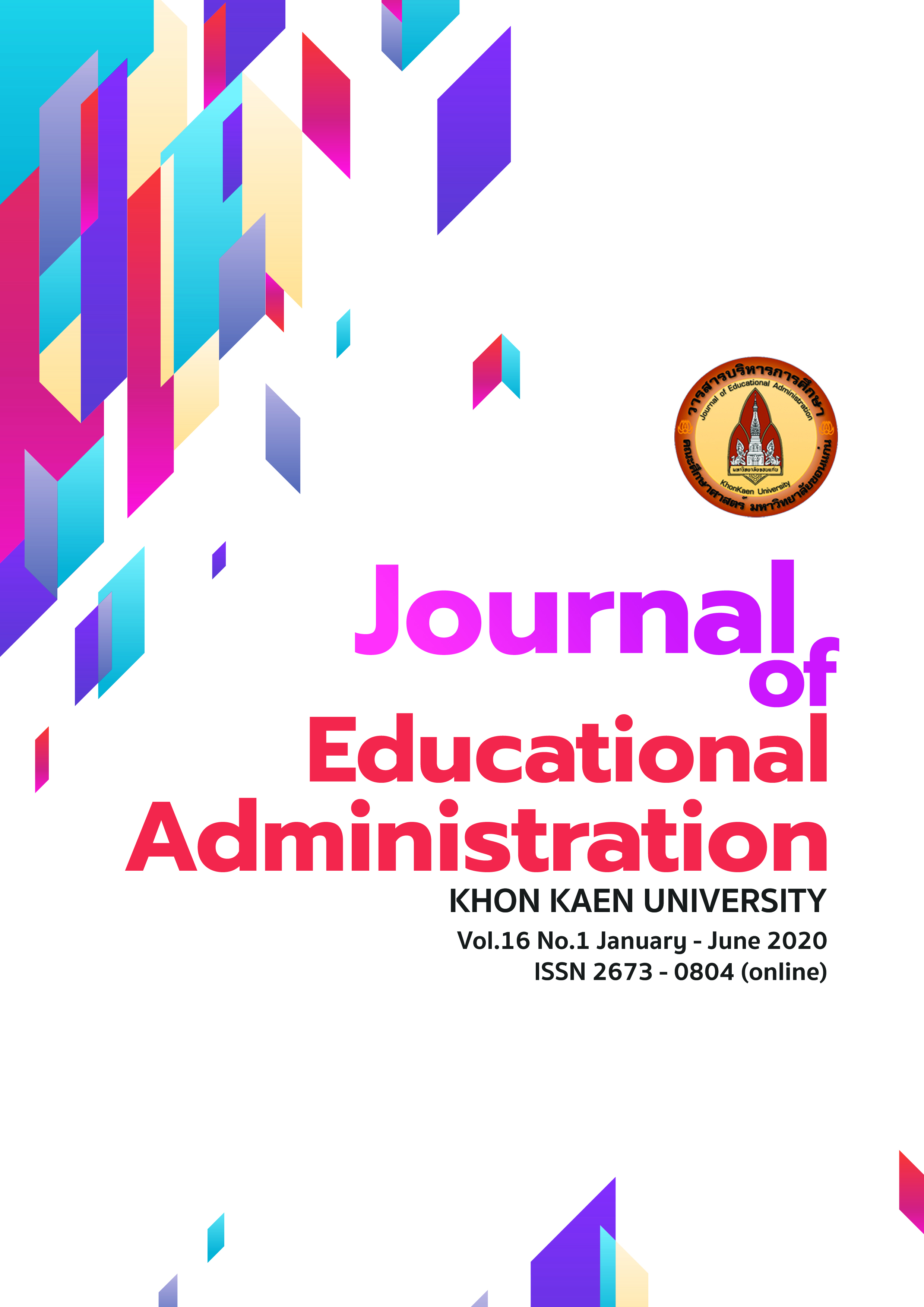การพัฒนาสมรรถนะผู้บริหารสถานศึกษาและกลยุทธ์พัฒนาการศึกษาที่มีผลต่อคุณภาพการสอน THE COMPETENCIES DEVELOPMENT OF SCHOOL ADMINISTRATORS’ AND STRATEGIES OF EDUCATIONAL DEVELOPMENT AFFECTING TEACHING QUALITY
Main Article Content
บทคัดย่อ
วัตถุประสงค์ของการวิจัยเพื่อ 1) ศึกษาสภาพการณ์ของสมรรถนะผู้บริหารสถานศึกษาและกลยุทธ์พัฒนาการศึกษา 2) ศึกษาความสัมพันธ์ของปัจจัยที่เกี่ยวข้องกับการสมรรถนะผู้บริหารสถานศึกษาและกลยุทธ์พัฒนาการศึกษาที่มีผลต่อคุณภาพการสอน 3) ศึกษาแนวทางการพัฒนาสมรรถนะผู้บริหารสถานศึกษาและกลยุทธ์พัฒนาการศึกษาที่มีผลต่อคุณภาพการสอน กลุ่มตัวอย่างประกอบด้วยโรงเรียนมัธยมศึกษา สังกัดสำนักงานเขตพื้นที่การศึกษามัธยมศึกษาในภาคตะวันออกเฉียงเหนือ จำนวน 234 คน ใช้วิธีการสุ่มกลุ่มตัวอย่างแบบอย่างง่าย ผู้ให้ข้อมูลคือผู้จัดการโรงเรียน ผู้อำนวยการโรงเรียน ครูผู้สอน เครื่องมือวิจัยเป็นแบบสอบถามระดับความคิดเห็น โดยผลการทดสอบความเชื่อมั่นได้ค่า Alpha = .970 การวิเคราะห์ข้อมูลใช้การวิเคราะห์องค์ประกอบ ค่าความถี่ร้อยละ ค่าเบี่ยงเบนมาตรฐาน ค่าเฉลี่ย การวิเคราะห์เนื้อหาและ Multiple Regression Analysis
ผลการวิจัยพบว่า สภาพการณ์การพัฒนาสมรรถนะผู้บริหารสถานศึกษาและกลยุทธ์พัฒนาการศึกษาที่มีผลต่อคุณภาพการสอน มีสามองค์ประกอบหลักคือสมรรถนะผู้บริหารสถานศึกษา อยู่ในระดับมากมีค่าเฉลี่ยรวม 4.32 กลยุทธ์พัฒนาการศึกษา อยู่ในระดับมากที่สุด มีค่าเฉลี่ยรวม 4.29 และคุณภาพการสอน อยู่ในระดับมากมีค่าเฉลี่ยรวม 4.33 มีองค์ประกอบย่อยที่มีระดับการดำเนินการในระดับมากทุกด้าน ความสัมพันธ์ของตัวแปรทั้งสามด้านพบว่ามีความสัมพันธ์ในเชิงบวก อย่างมีนัยสำคัญทางสถิติที่ระดับ .01 แนวทางการพัฒนาสมรรถนะผู้บริหารสถานศึกษาและกลยุทธ์พัฒนาการศึกษาที่มีผลต่อคุณภาพการสอน สมรรถนะผู้บริหารสถานศึกษาและกลยุทธ์พัฒนาการศึกษามีความสัมพันธ์กับคุณภาพการสอนไปในทิศทางเดียวกัน และความคิดเห็นของผู้ทรงคุณวุฒิเกี่ยวกับแนวการพัฒนาสมรรถนะผู้บริหารสถานศึกษาและกลยุทธ์พัฒนาการศึกษาที่มีผลต่อคุณภาพการสอน พบว่าผู้ทรงคุณวุฒิทุกคนเห็นด้วยและเห็นว่ามีความเป็นไปได้ในการนำไปสู่การปฏิบัติจริงในโรงเรียนเอกชน
Article Details
เอกสารอ้างอิง
ขัตติยา ด้วงสำราญ. (2552). รูปแบบการบริหารเชิงกลยุทธ์สำหรับโรงเรียนขนาดเล็ก, วิทยานิพนธ์การศึกษาดุษฎีบัณฑิต คณะศึกษาศาสตร์ มหาวิทยาลัยบูรพา.
คณะกรรมการข้าราชการพลเรือน,สำนักงาน.(2548). การปรับใช้สมรรถนะในการบริหารทรัพยากรมนุษย์. เอกสารประกอบการสัมมนาเรื่อง สมรรถนะของข้าราชการ, 31 มกราคม 2548.
เฉลิมพล มีชัย. (2559). การพัฒนารูปแบบการฝึกอบรมสมรรถนะวิชาชีพหัวหน้างานด้านการผลิต, International Journal of Social Science and Humanity. vol. 6, no. 7, pp. 505-509.
โชติ แย้มแสง. (2557). กลยุทธ์การดำเนินงานสู่ความเป็นเลิศของสถานศึกษาปฐมวัยในจังหวัดปทุมธานี, สุทธิปริทัศน์, 28(86), 152-172.
ชุมศักดิ์ อินทร์รักษ์. (2549). การบริหารงานวิชาการ. พิมพ์ครั้งที่ 4. ปัตตานี : ฝ่ายเทคโนโลยีทางการศึกษาสำนักงานวิทยาบริการมหาวิทยาลัยสงขลานครินทร์วิทยาเขตปัตตานี.
ชัชรินทร์ ชวนวัน. (2548). บทความแนวทางการพัฒนาสมรรถนะตนเอง (Self Competency Development). สถาบันพัฒนาครู คณาจารย์และบุคลากรทางการศึกษา กระทรวงศึกษาธิการ.
เทื้อน ทองแก้ว. (2545).“ภาวะผู้นำ : สมรรถนะหลักของผู้บริหารในยุคปฏิรูป” วิชาการ. กรมวิชาการกระทรวงศึกษาธิการ, 5(9) กันยายน 2545.
สำนักงานเลขาธิการคุรุสภา, สำนักงาน.(2549). การจัดการองค์ทางการศึกษาโครงการพัฒนาวิชาชีพผู้บริหารการศึกษาและผู้บริหารสถานศึกษาประจำการ. กรุงเทพมหานคร : สำนักพัฒนาและส่งเสริมวิชาชีพ
สุรัสวดี ราชกุลชัย. (2547). การวางแผนและการควบคุมทางการบริหาร = Management planning and control. พิมพ์ครั้งที่ 4. กรุงเทพมหานคร : จุฬาลงกรณ์มหาวิทยาลัย, 2547
รวีวรรณ เผ่ากันหา. (2558). สมรรถนะทางการบริหารของผู้บริหารระดับภาควิชา สาขาวิชาพยาบาลศาสตร์มหาวิทยาลัยของรัฐ. วิทยานิพนธ์การศึกษาดุษฎีบัณฑิต คณะศึกษาศาสตร์, มหาวิทยาลัยบูรพา.
อัมพา ถ้วยงาม. (2561). การพัฒนาวิธีการประเมินสมรรถนะของผู้บริหารสถานศึกษาสังกัดสำนักงานคณะกรรมการการศึกษาขั้นพื้นฐาน. วิทยานิพนธ์การศึกษาดุษฎีบัณฑิต คณะศึกษาศาสตร์ มหาวิทยาลัยบูรพา
Hirtz, P.D. (2002). “Effective Leadership for Total Quality Management.” Dissertation Abstracts International. 63(05) : 2466-B : November.
Kennedy, Peter W. and Sandy Grogan, Dresser. (2005). Creating a Competency-Based
Workplace. Benefits & Compensation Digest ; February 2005, Vol. 42 Issue 2, p1.
King, S.W. (2002). “Effective Leadership for Quality Achievement and Organizational Learning.” Dissertation Abstracts International. 63(06) : 2302-A : December.
McClelland, David C. (1973). “Testing for Competence rather than Intelligence.”
American Psychologist. 28(1) : 1-14.
Smith, D. and Tomlinson, S., (2014).Taxonomy of educational objectives:The classification of educational goals.
New York: David McKay Co.
Spencer, M and Spencer, M.S. (1993). Competence at work: Models for Superiors Performance. New York: John Wiley & Sons.
Tucker, S.A. &Cofsky, K.M. (1994). Competency-Based Pay on a Banding Platform. ACAJournal. 3(1).
Woods, Kathleen Ann O’Loughlin. (1998). “Leadership Factors That Influence EducationalExcellence,” Dissertation Abstracts International. 59(03) : 688 - A ; September.


